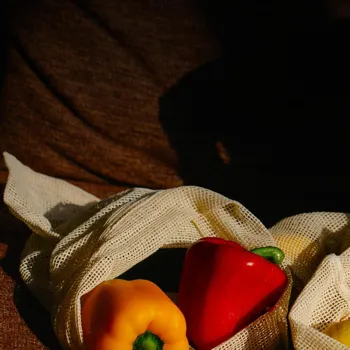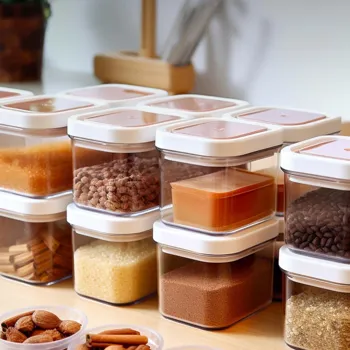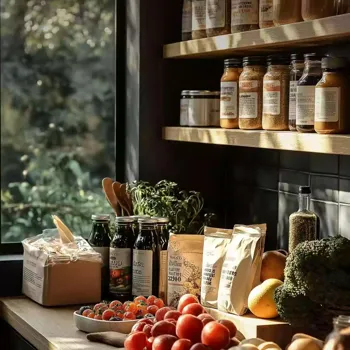Discover how to eat healthy & help the planet with these 10 easy tips. Small changes, big impact on our environment!
Going Green on Your Plate: 10 Easy Ways to Eat Healthy and Help the Planet
Eating habits
impact climate change; make eco-friendly choices
In today's world, climate change is a real concern and we all need to do our bit. One significant way to make a difference is by being mindful of our eating habits. Eating healthy shouldn't just be about what's good for your body, but also what's good for the environment.

It's about making choices that reduce your carbon footprint and support sustainable practices. This article will highlight ten simple yet effective ways you can reduce your environmental impact while simultaneously enjoying a nutritious and wholesome diet.
It's all about small changes that can add up to a big positive effect on our planet.
Shop local for fresh, seasonal produce to reduce carbon emissions
Firstly, shop local and seasonal! Instead of buying produce shipped from far-off lands, opt for what's grown nearby. Visiting farmers' markets is a great way to find fresh, seasonal fruits and vegetables while supporting local farmers.
This drastically reduces the carbon emissions associated with transportation, and the food often tastes better too! Seasonal produce is at its peak flavor and nutritional value, meaning you get the most out of what you eat. Plus, you are directly investing in your community’s economy.
Choosing local and seasonal produce is a win-win for your health and the environment. Think of it as a delicious way to shrink your carbon footprint. This helps to reduce the carbon emission associated with transport.
Embrace plant-based meals for the planet & your health
Secondly, embrace plant-based meals even if you are not a vegan or vegetarian. Reducing your consumption of animal products can significantly lower your environmental impact. Incorporate more vegetarian meals into your weekly routine.
Experiment with recipes featuring lentils, beans, chickpeas, tofu, and other plant-based protein sources. There are countless delicious and satisfying vegetarian recipes waiting to be discovered!
Plant-based diets generally require fewer resources, like water and land, to produce compared to animal-based diets. This simple shift can have a huge positive impact on the planet while expanding your culinary horizons and providing diverse nutrients. Consider it a tasty adventure with a purpose.
Reduce food waste to protect the planet and save money
Thirdly, reduce food waste. Food waste is a major environmental problem, contributing to greenhouse gas emissions and wasting valuable resources. Plan your meals carefully, only buy what you need, and store food properly. Get creative with leftovers!
Turn them into new dishes or freeze them for later use. Compost food scraps instead of throwing them away. Composting reduces landfill waste and creates nutrient-rich soil for your garden. Reducing food waste saves you money and helps protect the planet.
Every little bit counts, making this one of the most impactful things you can do at home. It is a way to respect the resources that went into producing that food.
Choose whole, unprocessed foods for health and sustainability
Fourthly, choose whole, unprocessed foods. Processed packaged foods often require more energy and resources to produce and transport. Opt for whole, unprocessed foods like fruits, vegetables, grains, and legumes.
Preparing your own meals from scratch also allows you to control the ingredients and portion sizes, promoting healthier eating habits. By choosing naturally available foods, you also cut down the plastic usage associated with its packaging.
This also encourages conscious eating and gives a feeling of doing something in a sustainable way. This not only reduces your environmental impact but also improves your overall health.
Grow your own food for fresh, homegrown produce and connection to nature
Fifthly, grow your own food. Even if you have limited space, you can grow herbs, vegetables, or fruits in containers on your balcony or windowsill. Gardening connects you with nature and provides fresh, homegrown produce.
It also reduces your reliance on store-bought food and the associated environmental impact. Gardening is a therapeutic activity that can reduce stress and promote well-being. Imagine the joy of harvesting your own tomatoes or herbs! It’s a rewarding experience that benefits both you and the planet.
Plus, you know exactly where your food comes from and how it was grown.
Buy in bulk for sustainability and savings
Sixthly, buy in bulk. Purchasing staples like grains, legumes, and nuts in bulk reduces packaging waste. Look for stores that offer bulk bins or bring reusable containers to fill. Buying in bulk can also save you money and reduce your trips to the grocery store.

Reduced packaging means less plastic ending up in landfills or polluting the environment. Each small choices can have a huge impact on your wallet. So embrace the bulk life and embrace a more sustainable way of shopping. Plus, you'll always have your favorite pantry staples on hand!
Support sustainable brands for a better future
Seventhly, choose sustainable brands. Support companies that prioritize environmental sustainability and ethical practices. Look for certifications like fair trade, organic, and rainforest alliance.

These certifications ensure that products are produced in an environmentally and socially responsible manner. Do your research and choose brands that align with your values. Your purchasing power can influence companies to adopt more sustainable practices.
By supporting sustainable brands, you are voting with your wallet for a better future. It sends message that customers care about the environment.
Reduce plastic use for environmental protection; opt for reusable items
Eighthly, reduce your reliance on plastic. Plastic pollution is a major environmental problem. Avoid single-use plastics like plastic bags, straws, and plastic water bottles. Carry reusable shopping bags, drinking glasses, and water bottles with you.

Choose products packaged in glass or paper instead of plastic. Recycle plastic when possible. Reducing plastic consumption is crucial for protecting wildlife and preserving our oceans and lands. Every time you choose a reusable option, you are making a positive impact.
It is a small change with a big difference on our planet’s health.
Choose sustainable transportation to reduce carbon footprint
Ninthly, be mindful of your transportation choices. Walk, bike, or use public transport whenever possible. This reduces carbon emissions and promotes physical activity. If you must drive, consider carpooling or using a fuel-efficient vehicle.

Transportation accounts for a significant portion of greenhouse gas emissions. Choosing more sustainable transportation options is a simple way to reduce your carbon footprint. Plus, walking and biking are great ways to connect with your community and improve your health.
It's a win-win for you and the environment.
Educate and spread awareness for a sustainable future
Tenthly, educate yourself and others. Stay informed about environmental issues and share your knowledge with friends and family. The more people who are aware of the impact of their choices, the more change we can create.
Encourage others to adopt sustainable practices and spread awareness about the importance of environmental conservation. Together, we can make a difference and create a healthier planet for future generations. Remember, every action counts, no matter how small it may seem.
Educate, empower, and inspire others to join the movement for a sustainable future.
AI Generated Content. Glance/InMobi shall have no liability for the content












